Creative Keyword Research
The title says it all. Being creative with keyword research means:
- Looking in places few bother to look;
- Arranging your content in such a way so that each keyword ends where other begins; and together they form the sequence called "total knowledge" about "X".

It sounds complicated, but it's dead simple and here's exactly what you need to do.
Rethinking Keyword Research- People Have Questions and Want Answers
Within this new approach to keyword research, every keyword is a question; because every question is a problem.
People have problems and they need answers and it's up to you to deliver them.
First I will show you 3 different ways of finding awesome questions people ask, and then I will give you a way to make a solid attempt at ranking for everything.
Rethinking Keyword Research- People Have Questions and Want Answers #keywords #seo Click To Tweet#1- Use Quora to Find Problems
Quora is a goldmine for question extraction. It's the one place, perhaps in the entirety of the internet, where people gather specifically to ask questions and to answer them.
And as a bonus, it has an excellent search function for you, the marketer, to dig through.
Here what happens when I search for our target keyword (Turmeric)
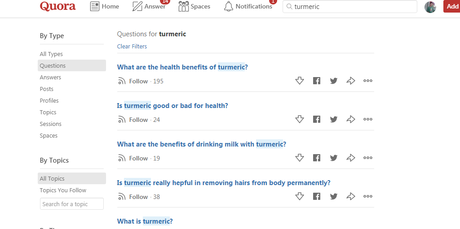
Dozens of keywords, dozens of problems and dozens of questions for you to give answers to.
Take all of those that make sense and put them into a Google Spreadsheet.
Here's a template you can use:
Now let's go hit up Twitter!
Quora is a goldmine for question extraction. It's the one place, perhaps in the entirety of the internet, where people gather specifically to ask questions and to answer them. #Quora Click To Tweet#2- Twitter for Creative Keyword Research
Open up the Twitter advanced search and search for Turmeric. There are plenty of setting to tinker with, but the ones you really need are:
Now click "search" and see what comes up.
Scroll down the search results and record everything that looks like a problem/question, or anything that could be formulated into one.
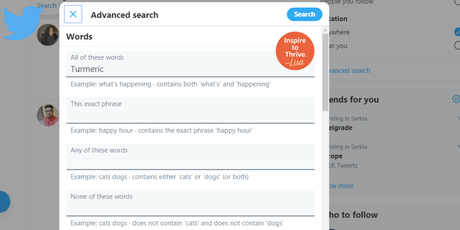
Finally, there's...
#3 Answer the Public
This tool is built by marketers for marketing and of course, is pure value for keyword research.
Enter your keyword and find every question you can about Turmeric.

Then dump them all in your spreadsheet.
Note: you will have to weed out duplicates and very similar questions. But you still should be left with at least 50 unique questions.
Remember, Turmeric is a very small niche. If you're in internet marketing space you could easily end up with 500 questions.
Now, before I show you how to build out your content w e need to add 2 more fields, into our Google Sheets. Those fields are "Topic" and "Querie"
a) TopicThis is the mother topic or niche. For us here it will all be Turmeric but when you're doing keyword research for multi niche site you will have to differentiate between niches.
Make sure you record them correctly!
b) QueriesQuery is what we SEO's call a keyword. That is the phrase we'll be a targeting with our content. So we'll be answering questions people have but our content will be optimized around queries.
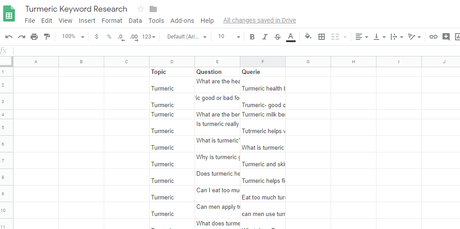
How to Organize Your Site's Content for Maximum Ranking Benefit
Google really likes when you're authority about X and it's insanely hard to rank on just authority alone. In fact, I'd say it's nearly impossible to rank in Google without established site-wide topical relevance.
T hat is why you often see huge general authority site's like Entrepreneur, Fox and Inc nearly always ranking in top 10, but almost never in the first 3 positions.
Their massive authority gets them to the first page, but lack of domain relevance prevents them from conquering the top of the SERPS.
So, to increase you site's relevance in respect to certain topic and thus lessen the hurdle of not having enough authority, I propose you use a topic+cluster model to build out your site.
You topics are you main theme, in our case that is Turmeric, and your clusters are supporting articles. Sort of like planets orbiting the Sun.
It looks something like this:
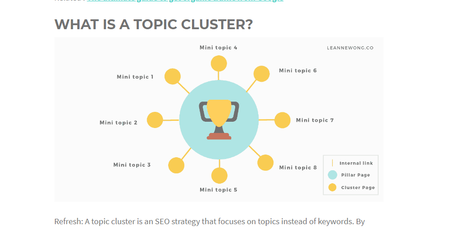
image source https://shemeansblogging.com/create-topic-clusters-to-rank-for-thousands-of-keywords/
So your master guide will be there to talk about Turmeric in general, while your supporting articles will be there to provide in-depth coverage of every aspect (question) people have around the topic.
And for the SEO side of this, all these articles will be cross-linked with keyword-rich internal links. This will drive your site's relevancy meter through the roof and Google will know you're a true authority on the subject.
Here' are 3 good examples:
#1- Guide on Blogging
Their massive authority gets them to the first page, but lack of domain relevance prevents them from conquering the top of the SERPS. #SEO Click To TweetMy friend Mudassir has a guide on how to start blogging in 2020. That guide is his pillar article because his whole site is about blogging.
And his site already boasts 300 articles, all on different aspects of blogging and all a wonderful addition to his master guide.
And of course each of his supporting article links to the master guide via the menu.
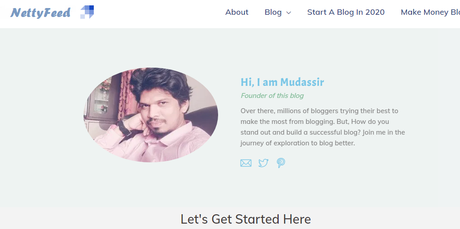
That is a wonderful SEO strategy and no doubt it will pay off for him
#2- My Affiliate Marketing Training Category
My site will be a multi niche site. These niches will be different but also shoulder niches (related)One of the main categories will be
affiliate marketing (here it is https://nikolaroza.com/category/affiliate-marketing/) and it will host all articles about the topic. I currently have less than 10, but soon will expand into dozens.
What' more, once I've expanded and exhausted my pool of keyword/questions to target, I will then create my affiliate marketing ABSOLUTE guide.
And all supporting articles will link to my main guide.
Because I calculated that it pays more to target long tail keywords and questions first, and then go after the main term.
My site is weak to compete with the likes of Neil Patel but it can conquer quite a few of those easy keywords. And that's a great start for me.
#3- Lisa's Agorapulse Review
Why do things in reverse?Lisa loves AgoraPulse and she has created a thoughtful review of the tool.
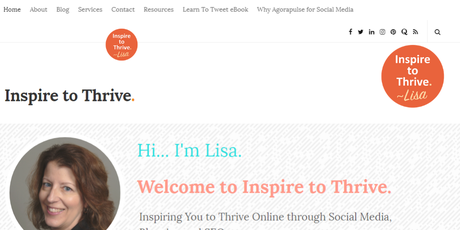
Now, what she coul d do is go into Quora and Twitter and see what questions people have about this tool. Then she could create a series of blog post that answer those.
Similar thing is with my friend Arfa and her Elegant Theme review. That theme is easy to use if you have any clue whatsoever, but probably looks intimidating to total newbies.
So they're confused and have a tonne of questions, question which Arfa could answer on her site, in a series of blog posts.
Conclusion
It's not that hard to create a full-blown SEO strategy just by answering questions, solving problems and delivering value.
And being creative with keyword research means finding opportunity where others see difficulties.
So are you going to whine that SEO is hard? Or are you going to go for it?
Lisa loves #AgoraPulse and she has created a thoughtful review of the tool. Click To TweetTell me in the comment section below.


